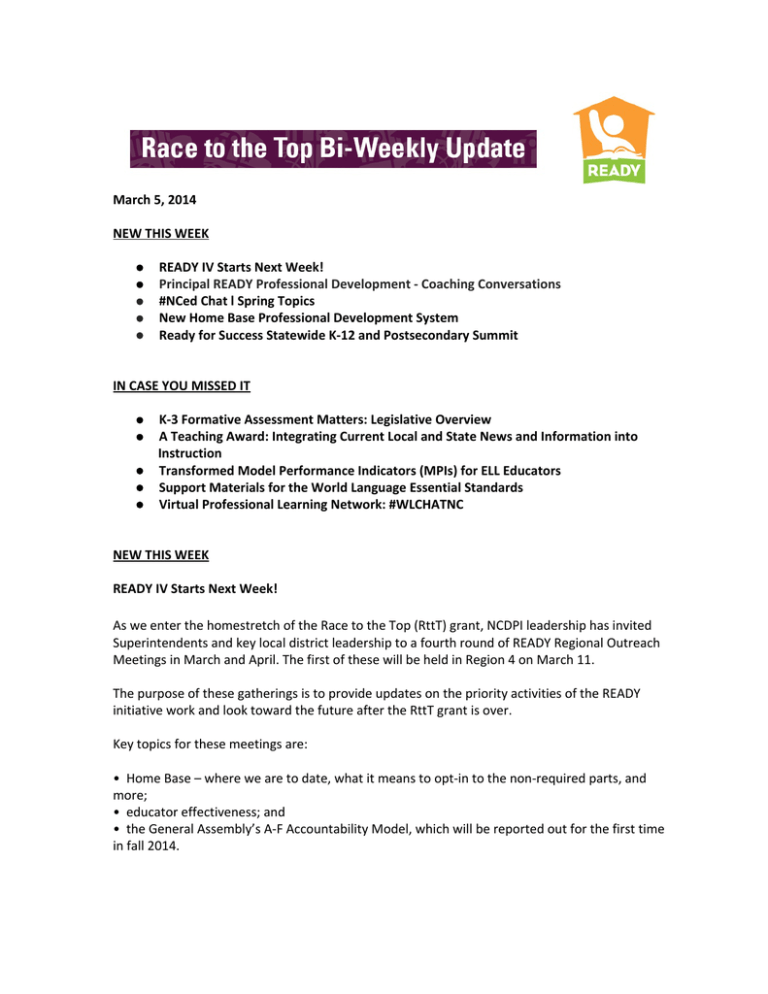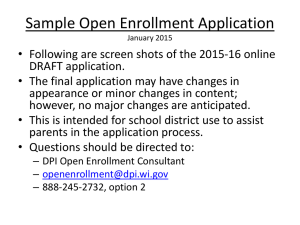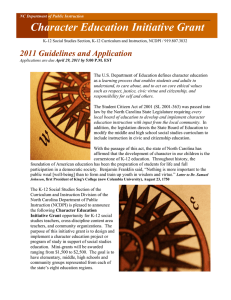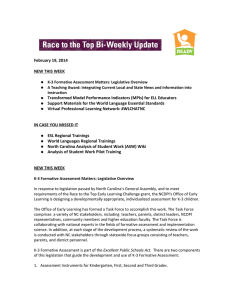March 5, 2014 NEW THIS WEEK #NCed Chat l Spring Topics
advertisement

March 5, 2014 NEW THIS WEEK ● ● ● ● ● READY IV Starts Next Week! Principal READY Professional Development - Coaching Conversations #NCed Chat l Spring Topics New Home Base Professional Development System Ready for Success Statewide K-12 and Postsecondary Summit IN CASE YOU MISSED IT ● ● K-3 Formative Assessment Matters: Legislative Overview A Teaching Award: Integrating Current Local and State News and Information into Instruction ● Transformed Model Performance Indicators (MPIs) for ELL Educators ● Support Materials for the World Language Essential Standards ● Virtual Professional Learning Network: #WLCHATNC NEW THIS WEEK READY IV Starts Next Week! As we enter the homestretch of the Race to the Top (RttT) grant, NCDPI leadership has invited Superintendents and key local district leadership to a fourth round of READY Regional Outreach Meetings in March and April. The first of these will be held in Region 4 on March 11. The purpose of these gatherings is to provide updates on the priority activities of the READY initiative work and look toward the future after the RttT grant is over. Key topics for these meetings are: • Home Base – where we are to date, what it means to opt-in to the non-required parts, and more; • educator effectiveness; and • the General Assembly’s A-F Accountability Model, which will be reported out for the first time in fall 2014. Superintendents were notified this week of the central office personnel to accompany them to the meetings. They include: • • • • • • Curriculum and Instruction Director Human Resources Director Technology Director Finance Director Data Manager Parent Representative, such as a PTA President Superintendents are notifying the NCDPI their intent to attend and bring colleagues. MORE INFO: Michael Yarbrough, Communication and Information Services, michael.yarbrough@dpi.nc.gov Principal READY Professional Development - Coaching Conversations Regional professional development sessions for principals are currently occurring in all 8 regions across the state. Interactive sessions include coaching conversations for teacher growth and educator evaluation data analysis. Principals will share strategies for providing constructive feedback to teachers. Resources and tools for interactive staff meetings are included in these sessions. MORE INFO: Dr. Lynne Johnson, lynne.johnson@dpi.nc.gov, Educator Effectiveness, or Kimberly Simmons, Kimberly.simmons@dpi.nc.gov, Educator Evaluation. #NCed Chat l Spring Topics Engage with state, national and international educators on the following topics in March: Flipped Classroom Learning, Best Practices for 1:1, Digital Footprint, and Mentoring. Check out the blog and archived conversations found here: http://ncedchat.blogspot.com/ Download the app by visiting myapp.is/NCed on your mobile device. Join this Professional Learning Network (PLN) today! MORE INFO: Dr. Lynne C. Johnson, Educator Effectiveness, lynne.johnson@dpi.nc.gov. New Home Base Professional Development System The new Home Base Professional Development System will be live for all district/charter educators to enroll in state-provided courses beginning April 1. All of our NC Education online modules, including facilitator-led sessions, are included in this system. Our NCDPI module developers are currently creating additional modules based upon district request for release this summer and fall. This spring, we will pilot the opt-in functionality of the system with a small group of districts. District and charters that opt-in to Home Base will benefit from additional local course/catalog creation and enrollment management functionality beginning in the fall. This is a great opportunity to use one portal for state and local educator PD transcripts. To learn more about this exciting new component and available options, please view the archived webinar that was recently held. Find the link here https://vimeo.com/87813848. In addition, regional face-to-face sessions are held in all 8 regions starting Thursday, March 20. Please see our NCDPI / RESA partnership schedule for more information, http://www.ncpublicschools.org/profdev/calendar/ . Human Resource and Professional Development Directors, PD Coordinators and leaders, are especially encouraged to attend. MORE INFO: Dr. Lynne Johnson, lynne.johnson@dpi.nc.gov, or Robert Sox, Robert.sox@dpi.nc.gov, Educator Effectiveness. Ready for Success Statewide K-12 and Postsecondary Summit Register now for NC Ready for Success's inaugural Statewide K-12 and Postsecondary Education Summit. Themed, "Connecting K-12 and Higher Education in North Carolina for Student Success," this Summit will be a historic opportunity for faculty from across all sectors of education to convene around an agenda that promotes a more cohesive approach to educational success in North Carolina. Working with all of our Foundational Partners, the NC Community College System, the University of North Carolina, the NCDPI and NC Independent Colleges and Universities, the summit will provide participants with information related to current alignment efforts to bring all of the state’s educational sectors together for more student success. In addition to updates on the new Comprehensive Articulation Agreement, changes to developmental and competency-based education, participants will have the opportunity to network and learn from colleagues in other sectors about best practices and implications for the adoption of North Carolina's new Career and College Readiness standards. National and state speakers have been invited, and break-out sessions are being planned for an interactive and highly productive set of conversations and networking. Register by March 15 for the early registration fee of $35. MORE INFO: http://www.ncreadyforsuccess.com/how-were-helping/alignment-initiatives/summits/ IN CASE YOU MISSED IT K-3 Formative Assessment Matters: Legislative Overview In response to legislation passed by North Carolina’s General Assembly, and to meet requirements of the Race to the Top Early Learning Challenge grant, the NCDPI's Office of Early Learning is designing a developmentally appropriate, individualized assessment for K-3 children. The Office of Early Learning has formed a Task Force to accomplish this work. The Task Force comprises a variety of NC stakeholders, including teachers, parents, district leaders, NCDPI representatives, community members and higher education faculty. The Task Force is collaborating with national experts in the fields of formative assessment and implementation science. In addition, at each stage of the development process, a systematic review of the work is conducted with NC stakeholders through statewide focus groups consisting of teachers, parents, and district personnel. K-3 Formative Assessment is part of the Excellent Public Schools Act. There are two components of this legislation that guide the development and use of K-3 Formative Assessment: 1. Assessment Instruments for Kindergarten, First, Second and Third Grades. The State Board of Education shall develop, adopt and provide to the local school administrative units developmentally appropriate individualized assessment instruments consistent with the Basic Education Program and Part 1A of Article 8 of this Chapter for the kindergarten, first, second, and third grades. Local school administrative units shall use these assessment instruments provided to them by the State Board for kindergarten, first, second, and third grade students to assess progress, diagnose difficulties, and inform instruction and remediation needs. Local school administrative units shall not use standardized tests for summative assessment of kindergarten, first, and second grade students except as required as a condition of receiving federal grants. (From Section 7A.1.(e) G.S. 115C-174 (a) of the Excellent Public Schools Act) 2. Developmental screening and kindergarten entry assessment. (a) The State Board of Education shall ensure that every student entering kindergarten shall be administered a developmental screening of early language, literacy, and math skills within 30 days of enrollment. (b) The State Board of Education shall ensure that every student entering kindergarten shall complete a kindergarten entry assessment within 60 days of enrollment. (c) The developmental screening instrument may be composed of subsections of the kindergarten entry assessment. (d) The kindergarten entry assessment shall address the five essential domains of school readiness: language and literacy development, cognition and general knowledge, approaches toward learning, physical well-being and motor development, and social and emotional development. (e) The kindergarten entry assessment shall be (i) administered at the classroom level in all local school administrative units; (ii) aligned to North Carolina's early learning and development standards and to the standard course of study; and (iii) reliable, valid, and appropriate for use with all children, including those with disabilities and those who are English language learners. (f) The results of the developmental screening and the kindergarten entry assessment shall be used to inform the following: (1) The status of children's learning at kindergarten entry. (2) Instruction of each child. (3) Efforts to reduce the achievement gap at kindergarten entry. (4) Continuous improvement of the early childhood system. (From § 115C-83.1E of the Excellent Public Schools Act) The development of K-3 Formative Assessment responds to legislation passed by North Carolina’s General Assembly and meets requirements of North Carolina’s Race to the Top Early Learning Challenge grant with the ultimate goal of supporting teachers’ efforts to improve the experiences and outcomes for young children MORE INFO: Cindy Bagwell, Project Administrator, cindy.bagwell@dpi.nc.gov A Teaching Award: Integrating Current Local and State News and Information into Instruction Teachers who use current events as informational text in K-12 classrooms are eligible for the 2015 Dave Jones Award for the Advancement of Youth Readership. Teachers may access news through digital or print sources and apply what they learn to multiple subjects, English/Language Arts, Social Studies, Health, Science, Math, Art Education, Guidance and/or Career Technical Education. The recipient receives an honorarium and other recognition. The award’s sponsor, the North Carolina Press Foundation, also welcomes recommendations from educators who identify outstanding teachers who use current, relevant news and information to invigorate instruction. The June 2014 application deadline allows teachers to implement and report on approaches they use during the 2013-2014 school year. The application is available in two forms (one editable and one pdf), on the lower left side of this website: http://ncpressfoundation.org/ The pdf can be found here: http://ncpressfoundation.org/wp-content/uploads/2013/09/Dave-Jones-Award-app2014.pdf The award honors Dave Jones, a retired newspaper executive, who supported multiple education initiatives. A story about the award-winning teacher Patrick Vernon appears on the website and ran in his hometown newspaper. Transformed Model Performance Indicators (MPIs) for ELL Educators The Common Core State Standards call for teachers to simultaneously provide academically rigorous content instruction while promoting English language development. In order to support NC content and ELL educators in this endeavor, NC DPI Title III/ESL staff have formed the "Common Core and ELL Collaborative Task Force," who have worked over the course of the last year to create and write transformed Model Performance Indicators (MPIs) based on ELA Common Core Standards (Reading for Literature and Reading for Informational Text) and WIDA Standards (Grades 1, 3, 5, 6, 7, 8, 9-10, and 11-12). The NC DPI is planning to release these resources to the field by the end of February. The original writers, reviewers and editors will conduct a series of webinar sessions to go through the development process and to provide some suggestions on how to utilize these resources. MORE INFO: Nadja Trez, K-12 Curriculum and Instructional Services, nadja.trez@dpi.nc.gov. Support Materials for the World Language Essential Standards The World Languages Collaborative Team is in the process of crafting additional tools for teachers and administrators to use as they implement the World Language Essential Standards. Recently, a set of proficiency outcome posters were posted to the World Language wiki at http://wlnces.ncdpi.wikispaces.net/Proficiency+Posters, which can be used in classrooms or in communication with stakeholders to illustrate what students will be able to do with the language being learned once they complete a course. This spring, a set of Administrator Briefings are being drafted which will include a short overview of a World Language program paired with an observation form aligned to the NCEES standards. MORE INFO: Ann Marie Gunter, World Languages Consultant, ann.gunter@dpi.nc.gov Virtual Professional Learning Network: #WLCHATNC The World Languages Collaborative Team is building a network for sharing information and resources about policies, the World Language Essential Standards, the Analysis of Student Work process for Standard 6, and general feedback from World Language colleagues across the state. A monthly Twitter chat is scheduled for the first Monday of each month from 7:00-8:00 p.m. using the hashtag #WLchatNC. Please see http://wlnces.ncdpi.wikispaces.net/WLchatNC for more information, including a 5-minute video on how to join the conversation, a schedule of topics, and links to the archives. MORE INFO: Ann Marie Gunter, World Languages Consultant, ann.gunter@dpi.nc.gov. RACE TO THE TOP WEEKLY UPDATE INFO If you know someone who would like to be on this list, please send their email address(es) to Michael.Yarbrough@dpi.nc.gov. ***LINKS: PC users might need to press the CTRL button when clicking on a hyperlink in this document. Archived Race to the Top Weekly Updates are available online at: http://www.ncpublicschools.org/rttt/reports/weekly




